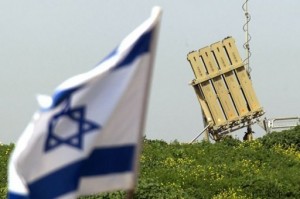Special to WorldTribune.com
TEL AVIV — Israel’s military said the newly-deployed Iron Dome
system could destroy a range of airborne threats.
The military said Iron Dome, manufactured by the state-owned Rafael
Advanced Defense Systems, has been configured to intercept mortars. The
system, used heavily in the Israel-Hamas mini-war this month, is also
said to be capable of downing fixed-wing aircraft.

“The Iron Dome operates day and night, in all weather conditions, and can intercept rockets with a range of less than 70 kilometers and mortars,” the military said on March 11. “It can also intercept low-flying aircraft.”
This marked the first time that Israel reported Iron Dome’s ability to destroy either mortars or aircraft. In 2011, officials acknowledged that Iron Dome could not stop Palestinian mortars, most of which contained a range of less than four kilometers.
“The Iron Dome has had a greater than expected record of operational successes,” the military said. “The Iron Dome is designed to only intercept rockets that are identified as heading for populated areas and strategic spots.”
The military reported that Iron Dome achieved an interception rate of more than 90 percent during the mini-war. From March 9-12, Palestinian gunners in the Gaza Strip fired more than 200 missiles, mortars and rockets
into Israel.
“Since the escalation began on March 9, the Iron Dome has intercepted
more than 90 percent of the rockets that it has targeted, a higher rate than
anticipated,” the military said.
Military sources said the rockets fired from the Gaza Strip have reached
unprecedented ranges in strikes on Israel. They said Iranian-supplied
rockets have landed closer than ever to Tel Aviv, Israel’s business capital.
“The rockets have reached ranges that we are not permitted to report,”
Nissim Keinan, a veteran correspondent for Israel state radio, said on March
13.
Officials said all elements of Iron Dome have been enhanced over the
last three months. They cited the Tamir interceptor, based on Rafael’s
air-to-air missile, as well as the fire control radar by Elta Systems, a
subsidiary of Israel Aerospace Industries.
The radar, developed within 18 months, was said to identify rocket
launches and help Tamir target incoming projectiles. Military sources said
the radar would undergo another upgrade, this time to enhance targeting of
high-flying enemy missiles and rockets.
“For me, the greatest importance of the Iron Dome is protecting the
sensitive points in Israel,” Elta chairman Nissim Hadas said. “The
interceptions provide relative security and allow for the continuation of
routine life as much as possible. We at Elta are located in Ashdod and we
had full attendance of employees because of the sense of security. There
were many sirens and we went in and out, but we continued to work.”

You must be logged in to post a comment Login